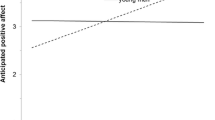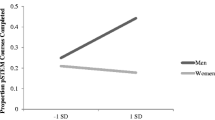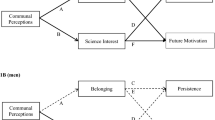Abstract
We examined whether women who pursue scientific training are viewed negatively by college students. Participants (N = 114 college students; 56 women, 58 men) saw a woman describe her major (either chemistry or the humanities) and express either strong commitment to her course of study or ambivalence about it. Participants then provided judgments about the speaker's traits (such as assertiveness and sociability), social behaviors (including how often she dates), and her future potential (including happiness and fulfillment with her career, as well as starting salary). Results indicated that both major and commitment level influenced perceptions of the speaker. Commitment to the major increased judgments of future career fulfillment, intellectual competence, school achievement, and assertiveness. Pursuit of chemistry, however, was perceived as negative, as people judged the woman as less sociable when she was committed to being a chemist, and women participants predicted she would have a less fulfilling career. Men participants said they would not want to date her. Although women may understand that they could make more money in the sciences, negative judgments about their social capabilities and future happiness may contribute to their propensity to avoid science.
Similar content being viewed by others
REFERENCES
Acker, S., and Oatley, K. (1993). Gender issues in education for science and technology: Current situation and prospects for change. Canadian Journal of Education 18: 255-272.
American Chemical Society (2001). Women Chemists 2000: Analysis of the American Chemical Society's Survey of the Salaries and Employment Status of its Domestic Members, American Chemical Society, Washington, DC.
Archer, J. (1996). Sex differences in social behavior. American Psychologist 51: 909-917.
Beller, M., and Gafni, N. (2000). Can item format (multiple choice vs. open-ended) account for gender differences in mathematics achievement? Sex Roles 42: 1-22.
Beyer, S. (1995). Maternal employment and children's academic achievement: Parenting styles as mediating variables. Developmental Review 15: 212-253.
Bodner, G. M., and Guay, R. B. (1997). The Purdue Visualization of Rotations Test. The Chemical Educator 2: 1-18.
Brown, R. P., and Josephs, R.A. (1999). A burden of proof: Stereotype relevance and gender differences in math performance. Journal of Personality and Social Psychology 76: 246-257.
Brownlow, S., and Durham, S. (1997). Sex differences in the use of science and technology in children's cartoons. Journal of Science Education and Technology 6: 103-110.
Brownlow, S., Jacobi, T., and Rogers, M. I. (2000). Science anxiety as a function of gender and experience. Sex Roles 42: 119-131.
Carter, C. S., LaRussa, M. A., and Bodner, G. M. (1987). A study of two measures of spatial ability as predictors of success in different levels of general chemistry. Journal of Research in Science Teaching 24: 645-657.
Casey, M. B., Nuttall, R. L., and Pezaris, E. (1997). Mediators of gender differences in mathematics college entrance test scores: A comparison of spatial skills with internalized beliefs and anxieties. Developmental Psychology 33: 669-680.
Coleman, S. L., and Gotch, A. J. (1998). Spatial perception skills of chemistry students. Journal of Chemical Education 75: 206-209.
Colley, A., Comber,C., and Hargreaves, D. J. (1994). Gender effects in school subject preferences: A research note. Educational Studies 20: 13-18.
Collis, B., and Ollila, L. (1990). The effect of computer use on grade 1 children's gender stereotypes about reading, writing, and computer use. Journal of Research and Development in Education 24: 2-8.
Cooper, J., Hall, J., and Huff, C. (1990). Situational stress as a consequence of sex-typed software. Personality and Social Psychology Bulletin 16: 419-429.
Dimitrov, D. M. (1999). Gender differences in science achievement: Differential effect of ability, response format, and strands of learning outcomes. School Science and Mathematics 99: 445-451.
Fouad, N. A., and Smith, P. L. (1996). A test of a social cognitive model for middle school students: Math and Science. Journal of Counseling Psychology 43: 338-346.
Furnham, A., and Rawles, R. (1995). Sex differences in the estimation of intelligence. Journal of Social Behavior and Personality 10: 741-748.
Halpern, D. F. (1986). A different answer to the question, “do sex-related differences in spatial abilities exist?” American Psychologist 41: 1014-1015.
Halpern, D. F. (1997). Sex differences in intelligence. American Psychologist 52: 1091-1102.
Harris, A. M., and Carlton, S. T. (1993). Patterns of gender differences on mathematics items on the Scholastic Aptitude Test. Applied Measurement in Education 6: 137-151.
Heatherington, L., Daubman, K. A., Bates, C., Ahn, A., Brown, H., and Preston,C. (1993). Two investigations of “female modesty” in achievement situations. Sex Roles 29: 739-754.
Holden, C. (1987). Female math anxiety on the wane. Science 236: 660-661.
Jacobs, J. E., and Eccles, J. S. (1992). The impact of mothers' genderrole stereotypic beliefs on mothers' and childrens' ability perceptions. Journal of Personality and Social Psychology 63: 932-944.
Jussim, L., and Eccles, J. S. (1992). Teacher expectations. II: Construction and reflection of student achievement. Journal ofPersonality and Social Psychology 63: 947-961.
Kahle, J. B., Parker, L. H., Rennie, L. J., and Riley, D. (1993). Gender differences in science education: Building a model. Educational Psychologist 28: 379-404.
Kass, S. J., Ahlers, R. H., and Dugger, M. (1998). Eliminating gender differences through practice in an applied visual spatial task. Human Performance 11: 337-349.
Kimball, M. M. (1989). A new perspective on women's math achievement. Psychological Bulletin 105: 198-214.
Ledbetter, C. E. (1993). Qualitative comparison of students' constructions of science. Science Education 77: 611-624.
Lent, R. W., Lopez, F. G., and Bieschke, K. J. (1991). Mathematics self-efficacy: Sources and relation to science-based career choices. Journal of Counseling Psychology 38: 424-430.
Lips, H. M. (1992). Gender-and science-related attitudes as predictors of college students' academic choices. Journal of Vocational Behavior 40: 62-81.
Lytton, H., and Romney, D. M. (1991). Parents' differential socialization of boys and girls: A meta-analysis. Psychological Bulletin 109: 267-296.
Mallow, J. V. (1994). Gender-related science anxiety: A first binational study. Journal of Science Education and Technology 3: 227-238.
Paulsen, K., and Johnson, M. (1983). Sex role attitudes and mathematical ability in 4th-, 8th-, and 11th-grade students from a high socioeconomic area. Developmental Psychology 19: 210-214.
Potts, R., and Martinez, I. (1994). Television viewing and children's beliefs about scientists. Journal of Applied Developmental Psychology 15: 287-300.
Pratto, F., Stallworth, L. M., Sidanius, J., and Siers, B. (1997). The gender gap in occupational role attainment: A social dominance approach. Journal of Personality and Social Psychology 72: 37-53.
Räsänen, L. (1991). Girls and the learning of physical concepts. The Finnish Journal of Education 22: 185-194.
Rennie, L. J., and Dunne, M. (1994). Gender, ethnicity, and students' perceptions about science and science-related careers in Fuji. Science Education 78: 285-300.
Seymour, E. (1995). The loss of women from science, mathematics, and engineering undergraduate majors: An explanatory account. Science Education 79: 437-473.
Shepardson, D. P., and Pizzini, E. L. (1992). Gender bias in female elementary teachers' perceptions of the scientific ability of students. Science Education 76: 147-153.
Signorella, M. L., and Jamison, W. (1986). Masculinity, femininity, androgyny, and cognitive performance: A meta-analysis. Psychological Bulletin 100: 207-228.
Smith, D. (2000). Women and minorities make gains in science and engineering education. Monitor on Psychology 31: 32.
Smith, T. E. (1992). Gender differences in the scientific achievement of adolescents: Effects of age and parental separation. Social Forces 71: 469-483.
Smith, A. E., Jussim, L., Eccles, J., VanNoy, M., Madon, S., and Palumbo, P. (1998). Self-fulfilling prophecies, perceptual biases, and accuracy at the individual and group levels. Journal of Experimental Social Psychology 34: 530-561.
Spencer, S. J., Steele, C. M., and Quinn, D. M. (1998). Stereotype threat and women's math performance. Journal of Experimental Social Psychology 35: 4-28.
Stricker, L. J., Rock, D. A., and Burton, N. W. (1993). Sex differences in predictions of college grades from Scholastic Aptitude Scores. Journal of Educational Psychology 85: 710-718.
Terborg, J. R., and Ilgen, D. R. (1975). A theoretical approach to sex discrimination in traditionally masculine occupations. Organizational Behavior and Human Performance 13: 352-376.
Trankina, M. L. (1993). Gender differences in attitudes toward science. Psychological Reports 73: 123-130.
Voyer, D., Voyer, S., and Bryden, P. (1995). Magnitude of sex differences in spatial abilities:Ameta-analysis and consideration of critical variables. Psychological Bulletin 117: 250-270.
Williams, J. E. (1994). Gender differences in high school students' efficacy expectation/performance discrepancies across four subject matter domains. Psychology in the Schools 31: 232-236.
Williams, K. (2000/2001). Understanding, communication anxiety, and gender in physics. Journal of College Science Teaching 30: 232-237.
Young, T. J. (1993). Women as comic book super heroes: The “weaker” sex in the Marvel universe. Psychology. A Journal of Human Behavior 30: 49-50.
Author information
Authors and Affiliations
Corresponding author
Rights and permissions
About this article
Cite this article
Brownlow, S., Smith, T.J. & Ellis, B.R. How Interest in Science Negatively Influences Perceptions of Women. Journal of Science Education and Technology 11, 135–144 (2002). https://doi.org/10.1023/A:1014613429388
Issue Date:
DOI: https://doi.org/10.1023/A:1014613429388




